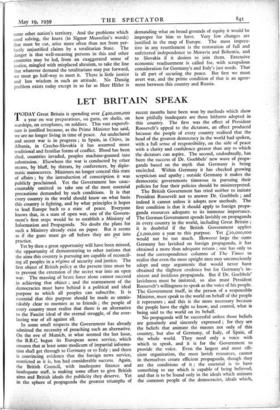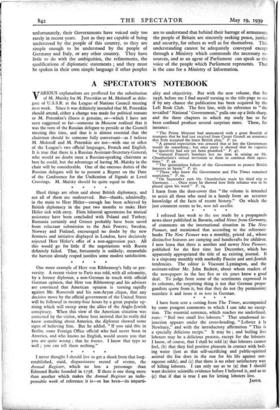LET BRITAIN SPEAK
TODAY Great Britain is spending over £400,000,000 a year on war preparations, on guns, on shells, on warships, on aeroplanes, on soldiers. This vast expendi- ture is justified because, as the Prime Minister has said, we are no longer living in time of peace. An undeclared and secret war is in progress ; in Spain, in China, in Albania, in Czecho-Slovakia it has assumed more traditional and familiar forms of conflict. Blood has been shed, countries invaded, peoples machine-gunned into submission. Elsewhere the war is conducted by other means, by bluff, by threats, by conferences, by diplo- matic manoeuvres. Ministers no longer conceal this state of affairs ; by the introduction of conscription it was publicly proclaimed. Yet the Government has unac- countably omitted to take one of the most essential precautions demanded by such conditions. It is that every country in the world should know on what basis this country is fighting, and by what principles it hopes to lead Europe back to a state of peace. Everyone knows that, in a state of open war, one of the Govern- ment's first steps would be to establish a Ministry of Information and Propaganda. No doubt the plans for such a Ministry already exist on paper. But it seems as if the guns must go off before they are put into practice.
Yet by then a great opportunity will have been missed, the opportunity of demonstrating to other nations that the aims this country is pursuing are capable of reconcil- ing all peoples in a ragime of security and justice. The first object of British policy at the present time must be to prevent the extension of the secret war into an open war. The massing of brute force alone cannot succeed in achieving that object ; and the rearmament of the democracies must have behind it a political and ideal purpose to which all peoples can subscribe. It is essential that this purpose should be made as unmis- takably clear to enemies as to friends ; the people of every country must realise that there is an alternative to the Fascist ideal of the eternal struggle, of the ever- lasting war of all against all.
In some small respects the Government has already admitted the necessity of preaching such an alternative.
On the eve of Munich, at what seemed the last hour, the B.B.C. began its European news service, which ensures that at least some modicum of impartial informa- tion shall get through to Germany or to Italy ; and there is convincing evidence that the foreign news service, restricted as it is, has had considerable success. Again, the British Council, with inadequate finance and Inadequate staff, is making some effort to give British aims and British ideals the publicity they deserve. Yet m the sphere of propaganda the greatest triumphs of recent months have been won by methods which show how pitifully inadequate are those hitherto adopted in this country. The first was the effect of President Roosevelt's appeal to the dictators, an effect produced because the people of every country realised that the head of the greatest democracy in the world had spoken, with a full sense of responsibility, on the side of peace with a clarity and confidence greater than any to which the dictators can aspire. The second, undoubtedly, has been the success of Dr. Goebbels' new wave of propa- ganda based on the myth that Germany is being encircled. Within Germany it has checked growing scepticism and apathy ; outside Germany it makes the democratic governments timorous in pursuing their policies for fear their policies should be misinterpreted.
The British Government has tried neither to imitate President Roosevelt nor to answer Dr. Goebbels ; and indeed it cannot unless it adopts new methods. The first condition is that it should apply to foreign propa- ganda resources adequate to its immense importance. The German Government spends lavishly on propaganda in every country in the world, including Great Britain ; it is doubtful if the British Government applies £1,000,000 a year to this purpose. Yet £20,000,000 would not be too much. However large the sums Germany has lavished on foreign propaganda, it has obtained a more than adequate return ; one has only to read the correspondence columns of The Times to realise that even the most upright men may unconsciously adopt and urge arguments that would never have obtained the slightest credence but for Germany's in- sistent and insidious propaganda. But if Dr. Goebbels' lavishness must be imitated, so also must President Roosevelt's willingness to speak as the voice of his people. The Government itself, in the person of a responsible Minister, must speak to the world on behalf of the people it represents ; and this is the more necessary because the people have the right to know, and control, what is being said to the world on its behalf.
No propaganda will be successful unless those beliefs are genuinely and sincerely expressed ; for they are the beliefs that animate the masses not only of this country, but also of Germany, of Italy, of Spain, of the whole world. They need only a voice with which to speak, and it is for the Government to provide the voice. Even the largest and most effi- cient organisation, the most lavish resources, cannot in themselves create efficient propaganda, though they are the conditions of it ; the essential is to have something to say which is capable of being believed, and that is to be found only in the ideals which animate the common people of the democracies, ideals which, unfortunately, their Governments have voiced only too rarely in recent years. Just as they are capable of being understood by the people of this country, so they are simple enough to be understood by the people of Germany and Italy, or any other country. They have little to do with the ambiguities, the refinements, the qualifications of diplomatic statements ; and they must be spoken in their own simple language if other peoples are to understand that behind their barrage of armaments the people of Britain are sincerely seeking peace, justice and security, for others as well as for themselves. This understanding cannot be adequately conveyed except through a Ministry which commands the necessary re- sources, and as an agent of Parliament can speak as the voice of the people which Parliament represents. That is the case for a Ministry of Information.



















































 Previous page
Previous page